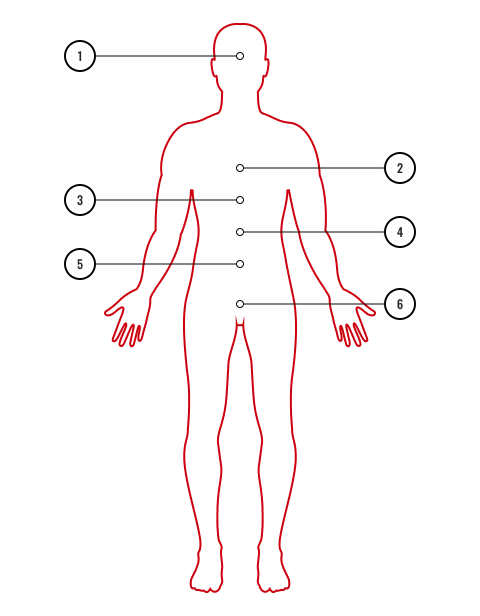In this topic, we focus on stress and the effects it can have on exercise and sport. You will learn about:
- Stress and its contributing factors
- Signs and symptoms of stress
- Different types of stress
- Stress management techniques.
Terminology and vocabulary reference guide
As an allied health professional, you need to be familiar with terms associated with basic exercise principles and use the terms correctly (and confidently) with clients, your colleagues, and other allied health professionals. You will be introduced to many terms and definitions. Add any unfamiliar terms to your own vocabulary reference guide.
Activities
There are activities throughout the topic and an end of the topic automated quiz. These are not part of your assessment but will provide practical experience that will help you in your work and help you prepare for your formal assessment.
It’s not the load that weighs you down, it’s the way you carry it.C.S. Lewis
Stress is the body’s natural response to an obstacle or test or a potentially dangerous or threatening situation. Everyone experiences stress from time to time, in anything from day-to-day situations such as work or family situations, to illnesses or a loss of a friend or loved one. It is also important to note that everyone’s response to the same situation will likely not be the same: for some it will be a small hiccup, feeling easy to overcome, for others the same situation could very well be incredibly stressful, it all depends on both attitude and also past experiences. Life can present a series of situations which may trigger some level of a stress response, for example:
- Bullying
- Work pressures
- Loss of job
- Relationship or marriage difficulties
- Divorce or break-up
- Death of someone close
- Problems at school
- Family troubles
- Tight unrealistic deadlines
- Relocation.
In small, short-term bursts, stress can be advantageous and even beneficial for health, helping cope with potentially serious situations, after all it was good for our hunter-gather ancestors so it cannot be bad for us. A stress response triggers a chance in the body’s chemical and hormonal balance, increasing heart and breathing rate and stimulating the muscles to be ready to respond during that period, often referred to as “fight or flight response”. Whilst this protection and survival mechanism is an invaluable asset, remaining in a heightened state of stress for too long can lead damaging health implications as well as other mental health issues such as anxiety and depression and promoting factors which can contribute to chronic diseases, such as:
- Obesity
- Diabetes
- Heart disease
- Cancer
- Immune system dysfunction
- Anxiety disorders
- Depression
- Chronic fatigue syndrome
- Insomnia.
The signs of stress can typically be grouped into three different concepts:
- Cognitive
- Behavioural
- Emotional
The signs of stress can be found in the way an individual thinks, acts and expressing feeling. Everyone demonstrates this a little differently, but there are similar patterns which are more common amongst people generally.
Let us have a closer look at each of these. Click on the headings below to read more about each concept of stress.
Cognitive
Cognitive means that the person demonstrates stress through knowing and perceiving, which can in turn lead to an increase in one’s self-doubt, and make general life duties a little more challenging. If stress is affecting an individual’s cognitive abilities, it may have a big impact on decision making abilities. Have a look through the following cognitive signs.
Someone who is stressed is more likely to make poor judgements due to feeling overwhelmed or under pressure. It is likely that this person will progress at a slow-paced intensity when it comes to completing tasks and may also take some time to comprehend information.
An individual might be unsure of where to start or mix up certain duties. It is not uncommon for memory to be a little dazed and distracted elsewhere (even if not immediately related to the current task at hand).
A person who is stressed may exhibit signs of general pessimism in the forms of actions or words as most things surrounding them seem dark and gloomy. An individual may find themselves expecting things to go wrong or not in their favour. It is normal to fear the unexpected, but if this is a reoccurring theme, it may restrict the person to experience new things due to the fear that something will always go badly.
These can include thinking about events that have not even yet happened or being concerned about what might happen in the near future. Individuals who worry constantly may also be concerned about things that have happened in the past that could happen again or things that haven't happened yet but might or even things that have very little chance of happening.
This can be thoughts of multiple incidents at one time. It could simply be what could have gone better yesterday or mentally preparing for something which is coming up later today. Either way, the mind is juggling a large amount of data and it can be a lot for someone to handle.
A person who has difficulty concentrating may appear to be present, but in fact may be lost in a train of thoughts of their own. When an individual is not focused, they tend to have moments where they have missed a large part of a conversation.
Memory can be impacted when stressed. Forgetting occasionally is ok, but when this is constant it can be good sign that there are other things going on for that individual.
The sense of logical sequencing comes to most of us at a certain age, it is something we are taught from as early as early childhood. Most tasks require a step through a process- which could be simply waking up and fixing the bed, turning the computer on then off, or putting something back in the fridge after taking it out. While the processes seem quite basic, it is important to realise that with stressful situations, logic is not something that we may prioritise as much anymore.
Some people can cope well under pressure and thrive in a stressful environment. If the individual is not equipped in dealing with the pressures, then they may become flustered and withdrawn. An example in a classroom setting could be if the teacher asks a confident student in class a question at random, they might be able to think of response even if they do not know the correct answer, whereas a student who lacks in confidence may struggle with any type of response. This in turn may create a tension and force the student to avoid addressing questions in the future due to that one event alone.
Behaviour
Behaviour can be defined as the way in which an individual acts or conducts oneself, especially towards others. Isolation is one of the main tell-tale signs which seems to fall into most categories of signs of stress. Have a look through the following behavioural signs which may indicate when or if an individual is experiencing symptoms of stress.
When an individual is usually quite social with both family and friends and suddenly disconnects, this can be a sign that something not quite right. While this is not a sure indicator on all occasions, it is something to consider. There will be times when other reasons come into play such as a busy schedule or a disagreement however, should a friend or family seemingly withdraw for no reason, this could be a good indicator something is wrong or feeling overwhelming in their life and would be a good time to reach out and as if they are ok.
When there is tension between work colleagues or managers, there may be issues with performance or management of timeframes which impact on the overall work goal. Good relations are formed from effective communication and agreeance of certain topics, so while there will be times where disagreement will occur, it is important to work through it on a level head and not take things too personally. Should a colleague seemingly change in their temperament, check in and ask if they are ok, life can throw some curve balls and it may take asking them If they are ok for them to feel comfortable to open up and share their worries.
Feeling alone is not abnormal, it can happen to a lot of people from time to time for a variety of reasons. Some individuals still feel lonely while surrounded by a group of people which could be a bigger sign that something is troubling them and they are having difficulty connecting. An individual might find it useful to join in on a new dance or exercise class to meet fresh faces or explore a new area to give them a chance to meet someone they might not typically run into. Friends and social circles are a hugely beneficial component to the feeling of connection and improving mental health and general wellbeing.
Being distracted by circumstances or being consumed by stages of life that are high pressure can decrease energy levels and general overall desire, that can lead to a decline in sex drive. This is caused by a disruption in the hormone levels where the body release of hormones, such as cortisol and epinephrine.
An attitude of a person can be clearly seen in facial expressions, body language and tone of voice. When an individual makes themselves unapproachable by negatively presenting themselves, it makes it hard for both sides. While it is uncomfortable for the other person, it would also cause a tension to the individual. Most people can sense tension or anger even if it is not so direct. These situations can be tricky however it is important to remember this can be a sign that the individual is carrying a lot and it may just take a simple act of kindness or asking if they are ok to enable them to see that it is ok and they have a safe space to open up and share their feelings, providing an opportunity to release some of their tension, a problem shared is a problem halved.
When an individual is stressed, they may skip taking time out for themselves- however this not the best practice. A person can feel unavailable and uninterested in hobbies or interests. It is important to look out for signs where people neglect routines they have regularly been involved into in the past.
Emotional
Emotional stress may or may not be exhibited so broadly as it can be a little hidden- this type of sign would be more apparent in a person that is a close friend or family member, someone who is somewhat familiar e.g. If a family member is usually very talkative and then suddenly becomes quite closed off, this would be quite noticeable. It may not be easily as picked with a new friend, colleague or client, as it may be assumed that this behaviour forms part of their personality traits. Have a look through the following emotional signs of stress.
It is quite common to feel easily irritated in times of stress. When an individual is stressed, the smallest matter could be of annoyance, likely something that would not cause irritation usually however when an individual is feeling overwhelmed with stressful thoughts, the smallest action could trigger an irritable response.
It has often been said that ‘laughter is the best form of medicine’ being a great form of stress relief. Typically, when an individual is feeling consumed by stress, they exhibit a decreased sense of humour, often coupled with irritability, should someone you know appear to be less engaged in usually humorous events, this may be a sign they are feeling under pressure and have the feeling of carrying a lot of stress. While a sense of humour will not cure all illnesses, it can lighten the load of feeling stressed. Research has demonstrated some of the ways a person may benefit from laughter such as stimulation of organs, soothing tension, improved immunity system, increased personal satisfaction and improved mood.
Frustration usually stems from an outcome not being able to be met due to some obstruction. When an individual meets goals in life, they are usually satisfied. The more critical the goal is, the more frustrated someone is likely to become when it is unattainable. Although frustration has its negatives, it can also act as a motivator to adapt oneself in life’s challenges. Should someone you know show signs of frustration, it is usually a sign of feeling stressed, check in and ask if they are ok.
It is common to feel nervous or feel jitters at certain parts of life, but if this aspect is a big part of daily living it is considered a problem. Should an individual remain in this emotional state, this could result in having negative impacts on their physical and mental wellbeing. It would be of value to check in and establish what is making them feel this way and touch base with them. There could be a straightforward reason such as the individual may have been involved in car hijacking which has now cause constant fears when getting into the car, so taking some time to recover will be a standard process to combat this emotion. However, there may be another underlying reason, check in and establish if support is necessary and what kind of support.
When an individual is overworked, in their work or personal life, it can cause major effects on their overall performance and general mood. This could be evident in them appearing to be short tempered, frustrated, increasingly irritated or a change int heir emotional state, it could be for a reason which is easy to overcome, such as providing more help to complete the task at hand or it could be as a result of more larger, more complicated issue, for example, family or financial concerns. It is important to provide an opportunity to discuss and then consider what type of support would be appropriate to reduce the feeling of stress for that individual.
The feeling of helpless can arise from the belief that nothing can be done to resolve a particular situation, the problem at hand is too large to overcome or that the individual themselves feel that they are incapable of doing anything to change the situation. The feeling of helplessness is a learned emotion, meaning we were not born with the perception of defeat therefor this feeling has typically arisen because of past experiences. It is important to check in with the individual in an attempt to understand where these feelings have come from, professional support would be useful in order to guide the individual appropriately to understanding that this is a perception and not the truth of the situation and increase their positive thinking in a supportive way in order to give them the mental strength to begin to perceive these types of situations differently in the future.
Enthusiasm is expressed as interest and desire, motivating an individual to act and chase after goals. With an increased feeling of stress, typically, enthusiasm can dwindle creating the opposite effect and will often make an individual feel as if they have no motive for their life.
Effects of stress on the body
During stressful situations, the body goes through a range of changes which can be quite overwhelming at the time, as well as in the long term. The body has a natural response mechanism to release chemicals to protect the body with an aim to maintain homeostasis (the natural balance of the body’s internal environment). Some of the many reactions an individual may face can result in changes within the brain, heart, stomach, pancreas, intestines, and reproductive system.
While there are a number of systems of the body which can exhibit changes in response to stress, it is important to remember that each individual will have different responses to stress, so there may be some other signals of effects which may not have been specified.

Read the following list which provides an overview of the signs and symptoms of stress present within an individual.
- Brain and Nerves: Headaches, feelings of despair, lack of energy, sadness, nervousness, anger, irritability, trouble concentrating, memory problems, difficulty sleeping, mental health disorders (anxiety, panic attacks, depression, etc.)
- Heart: Faster heartbeat or palpitations, rise in blood pressure, increased risk of high cholesterol and heart attack.
- Stomach: Nausea, stomachache, heartburn, weight gain, increased or decreased appetite.
- Pancreas: Increased risk of diabetes.
- Intestines: Diarrhea, constipation, and other digestive problems.
- Reproductive Organs: For women – irregular or painful periods, reduced sexual desire. For men – impotence, low sperm production, reduced sexual desire.
- Other: Acne and other skin problems, muscle aches and tension, increased risk for low bone density and weakened immune system (making it harder to fight off or recover from illnesses).

Signs and symptoms of stress will vary between individuals in relation to their independent reaction to each situation. It is important to note that and individual’s response to a particular event may also be based on past experiences, therefore, resulting in different forms or levels of severity of the condition. As each instance is different, it is vital to be mindful of these factors and, in turn, an individual’s response, providing support and understanding without judgement.

Stress can typically be categorized into three different types with each having their own distinct symptoms, duration, and approaches for management:
- Acute stress
- Episodic acute stress
- Chronic stress
Let us take a look into each of the different types to learn more and be better equipped to recognize signs in those we work with.
Acute stress
Acute stress typically happens to us all. It is the body’s go to response to new and challenging situations, triggering the body’s ‘fight or flight’ response, for example, walking out into the road and narrowly missing a vehicle, starting a new job, work or school deadlines or being involved in an argument. Typically, acute stress evolves due to reactive or negative thinking and when the negative thinking subsides, so too does the acute stress response. Thankfully, acute stress is typically short lived and whilst triggering signs and symptoms within the body, brain, and emotional state, it does not typically cause significant damage, unlike episodic and chronic stress.
Short term effects of acute stress (not limited to):
- Anger, irritability, anxiety and or depression, or a combination of these
- Gut and bowel irritability (flatulence, constipation, or diarrhea)
- Tension
- Headache or migraine
- Back, neck or jaw pain
- General muscular tension
- Elevated heart rate
- Heart palpitations
- Sweaty palms
- Cold hands or feet
- Rapid pulse
- Dizziness
- Shortness of breath
- Sleep difficulties or insomnia
- Chest pain.
Episodic acute stress
Typically, episodic acute stress refers to the regular occurrence of acute stress symptoms or responses. Those who experience regular occurrences of acute stress tend to live in a state of worry and chaos, often feeling rushed or under pressure. These symptoms, however, may also be as a result of the nature of and individual’s employment such as law enforcement, medical professionals, and legal professionals for example. Such feelings can arise as a result of taking on too many responsibilities, spreading themselves too thin or poorly managing time. As no two people will respond to the same situation in exactly the same way, it is important to understand the situation from the individual’s perspective rather than our own and discuss and support without judgement.
Signs and symptoms of episodic acute stress include those of acute stress, however it is important to note that with the reoccurrence of such signs and symptoms, the effects of episodic acute stress can often lead to ongoing physiological and psychological damage and general suffering of an individual’s wellbeing.
Additional signs and symptoms applicable to episodic acute stress:
- Compromised learning of new tasks or activities
- Mental fatigue
- Decline in interpersonal relationships (work, friends, and family)
- High blood pressure, heart palpitations, chest pain, heart disease
- Gut problems similar in nature to IBS (irritable bowel syndrome)
- Compromised immune system (frequent colds, flu, allergies, and other immune system illnesses).
Chronic stress
Chronic stress occurs when stress levels are very high and last for an extended period of time. It is by far the most damaging form of stress. If left untreated over a long period of time, chronic stress can have significant and sometimes irreversible negative impacts on both the physical and psychological wellbeing of an individual as behavioural and emotional reactions can become ingrained leading to a change in the hardwiring of the brain and the body and, as a result, leading to being prone to feeling and demonstrating the signs of chronic stress regardless of the situation at hand, in a sense, becoming their go-to stress state.
Signs and symptoms of chronic stress include those of acute and episodic acute stress on a more frequent basis and lead to more significant health issues such as:
- A weakened immune system
- Cardiovascular disease
- Heart attack
- Stomach ulcers
- Stroke
- Cancers
- Anxiety
- Depression
- Acts of self-harm
- Violent attacks
- Homicide
- Psychosis
- Suicide.
It is important that the signs are spotted early, however, remember to remain within your scope of practice, refer where you think it is needed and then conduct a supportive role within your professional boundaries. Stress is a very individual journey which should be conducted without judgement.

The management of stress symptoms is key to the overall maintenance of physical and mental wellbeing. A “quick fix” may help in the short term but awareness of environment and triggers is important, and seeking help when required is an important step. Within the role of health and fitness, use the knowledge you have gained to support and advise your client where applicable whilst remaining in within your professional boundaries.
The following are some example of healthy and unhealthy actions which can either amplify or reduce symptoms of stress and, in turn, have either positive or negative implications on mental health.
| Healthy actions | Unhealthy actions |
|---|---|
| Meditating | Smoking |
| Spending time in nature | Using pills or drugs to relax |
| Physical exercise | Drinking too much |
| Talking & interacting with friends | Withdrawing from friends, family, and activities |
| Taking a long bath | Bingeing on junk or comfort food |
| Scented candles/oils | Procrastinating |
| Spending time with a pet | Zoning out for hours looking at your phone |
| Working in your garden | Filling up every minute of the day to avoid facing problems |
| Enjoying massage | Sleeping too much |
| Listening to music | Taking out your stress on others |
| Watching a comedy | Focusing on the problems at hand |
| Start a stress journal as a means to release and identify patterns | Finding faults and errors in all you do- negative self-talk |
The 4 A’s of stress management
The 4 A’s of stress management are tools which can be adopted in order to develop effective management of stress. Being aware of the nature and potential causes on stress is an important first step which can be achieved through self-reflection or guided reflection with the aid of a professional. With awareness comes the ability to then effectively and constructively manage – this can be achieved by implementing the 4 A’s.

Avoid
- Learn to say no to people or situations which do not serve you
- Avoid people who promote the feelings of stress
- Take control of your environment. Busy traffic? Change your route or leave work earlier/later
- Write down your to-do list, prioritise and leave out which is not important at that time or on the day.
Alter
- Expressing feelings instead of bottling them up- using ‘I’ sentences can aid in framing feelings appropriate in order to avoid others feeling attacked
- Be willing to compromise
- Create a balanced schedule- being realistic with timeframes can avoid feeling overwhelmed and setting the day up for failure
Accept
- Don’t try to control the uncontrollable- practice self-kindness, you cannot control everything so avoid worrying about that which is not in your control
- Look for the upside- every cloud has a silver lining, think positively and be kind to yourself
- Learn to forgive- it takes far more energy to be angry, forgiving may take practice however it will lighten your load and free you from sitting with burning anger, frustration and resentment
- Share your feelings- talk with someone, it may not solve the problem however sharing will ease the load and mean you are not alone with your feelings.
Adapt
- Reframe the problem- looking at the issue from a different standpoint will help a change in perspective, for example, instead of feeling frustrated about being stuck in traffic, see it as an opportunity to call a friend or loved one you haven’t spoken to in a while.
- Look at the big picture- asking ‘will this matter in a week/five years time’ is it worth the worry now?
- Adjust your standards- is the cleaning really important that it needs to be done twice a week? Redefine success and avoid striving for perfection
- Practice gratitude- stop the negative thinking and start appreciating yourself, your achievements and those around you.
Not all stress is bad — it can trigger the ‘fight-or-flight’ mechanism to help respond to an emergency or heighten our performance however prolonged exposure can lead to serious negative implications to both physical and mental health, some of which can be irreversible and lead to very serious and sometimes devastating outcomes. Should a person be exhibiting the signs of stress, it is important that they are aware they are not alone in their journey and to offer guidance for support when applicable. Stress happens, it is a natural part of life, largely unavoidable however with its potential impacts, it should be identified in a timely manner to be effectively managed and restore a healthy and happy way of life.
Stress is a very unique journey with no two individuals responding the same way to the same situation therefore it is of upmost importance to act with kindness and without judgment should you identify an individual experiencing a difficult time in their life.
In order to address stress effectively, it is important to have an action plan of strategies or remedies for the individual’s specific needs. Think about what kind of methods, experiences or activities would help you in feeling relaxed. Some people like to go for a stroll down near the water, others like to go out and have a few drinks with a group of friends, some people like to go to the spa with some relaxing music playing in the background- the bottom line is that everyone will deal with it differently, and there is not really any right or wrong way to respond to it.
In this topic, we focused on stress and the effects it can have on exercise and sport. You learnt about:
- Stress and its contributing factors
- Signs and symptoms of stress
- Different types of stress
- Stress management techniques.

